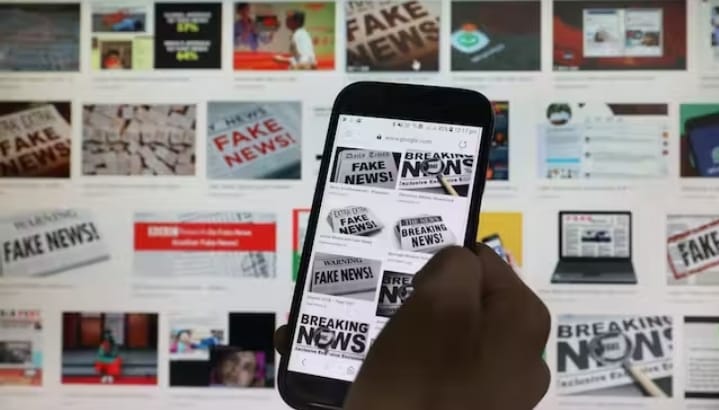Lack of Accountability Is ‘Existential Threat’ to Journalism
ABC to Pay Trump Library $15 Million for ‘Rape’ Error
Homepage photo credit: Article19.org
Journal-isms Roundtable photos by Don Baker/Don Baker Photography Group
Support Journal-ismsDonations are tax-deductible.
On “Rising,” Niall Stanage and Amber Duke discuss how billionaires Elon Musk, Jeff Bezos and Mark Zuckerberg compete for Donald Trump’s attention. (Credit: The Hill/YouTube)
Lack of Accountability Is ‘Existential Threat’ to Journalism
The influence of propaganda and disinformation on the American public has become such a threat to legitimate journalism that safeguards are needed to ensure that “the free flow of information” gathered by truth-seekers is protected, according to the U.S. director of Reporters Without Borders, one of the world’s largest and most influential press-freedom organizations.
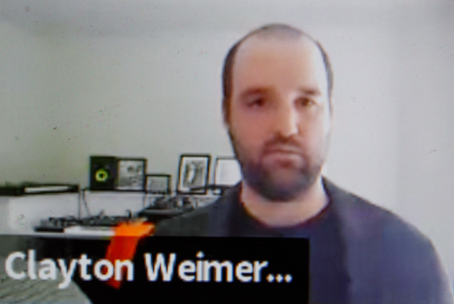 “We think of propaganda as yet another existential threat to journalism, partly because propaganda so often tries to displace journalism directly,” Clayton Weimers (pictured), executive director of the Reporters Without Borders Washington-based U.S. office, told the Journal-isms Roundtable.
“We think of propaganda as yet another existential threat to journalism, partly because propaganda so often tries to displace journalism directly,” Clayton Weimers (pictured), executive director of the Reporters Without Borders Washington-based U.S. office, told the Journal-isms Roundtable.
Propagandists do this “by mimicking it, by stealing its hallmarks, by stealing its authority so that it can confuse or convince something of something that isn’t real. But frankly, the purpose of propaganda often isn’t to make you believe something that isn’t true. It’s just to make you believe nothing at all. And that leads to more disengagement, more turning away from the news, which we’re all experiencing right now.
“I think we all have friends who are telling . . . right now, ‘Oh, I love you and your journalism, but I just can’t deal with the news right now.’ It’s so, so common right now. I think we’ve all heard it.
“So, you know, we really need to think of the way that the information space, especially online, is being structured as itself a threat to press freedom.
“When we have the new conduits of information being controlled by billionaires like Elon Musk or Mark Zuckerberg, we need to hold them more accountable.”
Musk, a key supporter of President-elect Donald Trump, bought Twitter in 2022, renaming it X.
Zuckerberg is co-founder and CEO of Meta Platforms, which includes Facebook, Instagram and Threads.
Weimers continued, “We need to find democratic safeguards and transparent safeguards that will help make us understand how information is getting to people and how we can ensure the free flow of information rather than a very, shall I say, colored view of the world that often you get from social media.
“Fixing the marketplace for news is an existential problem for journalism.”
The Paris-based press-freedom organization, known by its French acronym RSF, describes itself as “an international non-profit organization that has been working for 35 years to promote and defend journalism around the world.
“Through its Paris headquarters, 13 international bureaus and sections, and network of correspondents in 130 countries, as well as consultative status at the United Nations, UNESCO, the Council of Europe, and the International Organisation of the Francophonie, RSF has the experience and on-the-ground presence to effectively defend journalism on a global scale.”
Forty people were on the Journal-isms Roundtable Zoom call, with another 157 having watched on Facebook by Dec. 14, and 80 others on YouTube by then. (Credit: YouTube)
Weimers spoke at a Dec. 8 session of the Journal-isms Roundtable, at which experts on the economy, human rights, news coverage of the environment and on writing and emotional wellness — along with a former U.S. ambassador — joined a conversation with journalists about the after-effects of the November election and how journalists should approach what happens next.
The session took place three days after Paul Farhi and John Volk reported that “Donald Trump won the 2024 election with one of the smallest popular-vote margins in U.S. history, but in news deserts – counties lacking a professional source of local news – it was an avalanche. Trump won 91% percent of these counties over his Democratic rival, Kamala Harris, according to an analysis of voting data by Medill Journalism School’s State of Local News project.”
In addition, Pew Research found in November that about one in five U.S. adults, 21 percent, say they regularly get news from news influencers on social media.
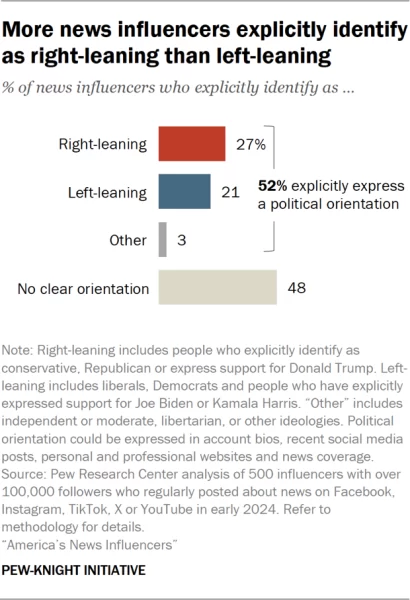
That is a trend accompanied by the steady disappearance of local news, the growth of distrust in institutions and the hostility toward the press expected from the incoming Trump administration, Weimers said.
Forty people were on the Zoom call, with another 157 having watched on Facebook by Dec. 14, and 80 others on YouTube by then. You can watch the embedded video again or call up this YouTube site.
Some of the observations:
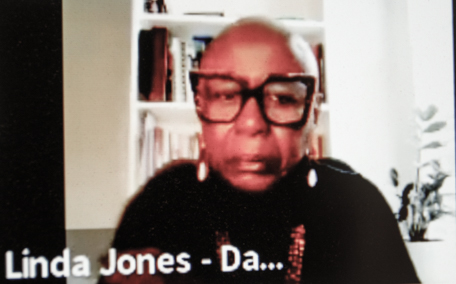 Linda Jones (pictured), a Dallas-based “writing and emotional wellness doula,” stressed the importance of maintaining emotional health, advice especially geared toward those who were invested in the success of Vice President Harris, the Democratic presidential candidate. Personal writing is one method. “Not the writing that brings us stress on deadline, but that personal writing.” It has to be “‘a constant practice, the constant practice of releasing, having a release valve. . . . and also being in community. . . . basically monitoring how you’re feeling at all times when you’re doing this work.”
Linda Jones (pictured), a Dallas-based “writing and emotional wellness doula,” stressed the importance of maintaining emotional health, advice especially geared toward those who were invested in the success of Vice President Harris, the Democratic presidential candidate. Personal writing is one method. “Not the writing that brings us stress on deadline, but that personal writing.” It has to be “‘a constant practice, the constant practice of releasing, having a release valve. . . . and also being in community. . . . basically monitoring how you’re feeling at all times when you’re doing this work.”
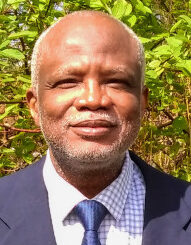 Earlier that day, Trump said on NBC’s “Meet the Press,” in his first one-on-one interview as president-elect, that the price of groceries and border issues won him the election. But Patrick Mason (pictured), chair of the Economics Department at the University of Massachusetts at Amherst, told the Roundtable he was alarmed by the net effect of Trump’s economic proposals.
Earlier that day, Trump said on NBC’s “Meet the Press,” in his first one-on-one interview as president-elect, that the price of groceries and border issues won him the election. But Patrick Mason (pictured), chair of the Economics Department at the University of Massachusetts at Amherst, told the Roundtable he was alarmed by the net effect of Trump’s economic proposals.
“Collectively, when you look at these economic policies, they’re just bad,” Mason said. “And they are designed to redistribute wealth and power toward the most affluent people.” Raising tariffs would be inflationary, mass deportations of the undocumented would be costly, and proposed budget cuts would likely reduce “critical societal building blocks, such as health care and education, which are essential for maintaining a stable and equitable society.
“Where you have tariffs on things that you’re buying from others, and you’re trying to deport people who are already here, it’s kind of like you’re closing off the international sector of the economy, which won’t be good for the overall economy in the country,” the economist said.
Mason, who spent 23 years at Florida State University, where he was professor of economics and director of African American Studies, said there had been a back-room attempt to undermine tenure in Florida. “If you do not have tenured professors, you won’t have anybody for the news media to talk to to explain complex issues, which then undermines the whole information process.
“So in the state of Florida, the entire education system was politicized from [Pre-K ]to Ph.D. in terms of the content of what can be taught, in terms of what professors can say. It already has a chilling impact.”
 Evlondo Cooper (pictured), senior researcher for the climate and energy program at the watchdog group Media Matters for America, said that in Trump’s previous term, he rolled back more than 100 environmental rules. But media coverage of climate and the environment “largely focused on the political theater, the inflammatory statements.”
Evlondo Cooper (pictured), senior researcher for the climate and energy program at the watchdog group Media Matters for America, said that in Trump’s previous term, he rolled back more than 100 environmental rules. But media coverage of climate and the environment “largely focused on the political theater, the inflammatory statements.”
This time, Trump is nominating fossil fuel advocates like oil-industry CEO Chris Wright to head the Energy Department and environmental regulation opponents such as former Rep. Lee Zeldin, R-N.Y., to lead the Environmental Protection Agency.
They “want to fundamentally reshape and undermine what I believe is minimal climate action that’s happened under the last few administrations.
“He’s going to plan to eliminate environmental justice offices across the country, redrawing national monument boundaries to enable drilling. These aren’t isolated changes, but part of a coordinated planned dismantling,” Cooper said.
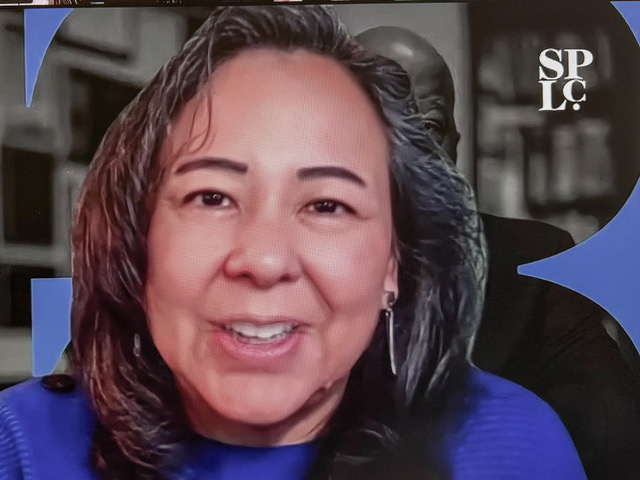 Margaret Huang (pictured), president and CEO of the Southern Poverty Law Center, which monitors hate groups, warned journalists about the correlation between Trump’s rhetoric and hate speech that leads to violence.
Margaret Huang (pictured), president and CEO of the Southern Poverty Law Center, which monitors hate groups, warned journalists about the correlation between Trump’s rhetoric and hate speech that leads to violence.
“The challenge lies in covering these perspectives without legitimizing harmful ideologies,” she said.
“Journalists have this really important role to play to distinguish between different political perspectives, people who might agree with some of the positions of the Jan. 6 folks but who are not actually advocating for the violent overthrow of government or who are not actually advocating for the return to other times of our history where people were treated as second class or less citizens.”
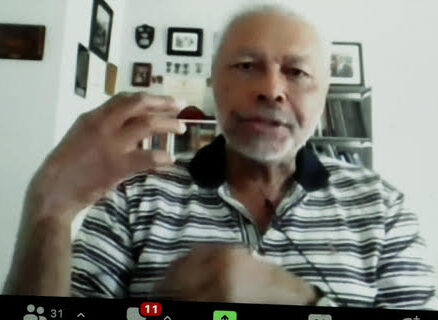 Charles Ray (pictured, by Sharon Farmer) a former U.S. ambassador and chair and trustee of the Africa Program at the Foreign Policy Research Institute, wrote this month for the Daily Kos, “it’s plain to see that the one thing we can all depend on after January 2025, is chaos and plenty of it.
Charles Ray (pictured, by Sharon Farmer) a former U.S. ambassador and chair and trustee of the Africa Program at the Foreign Policy Research Institute, wrote this month for the Daily Kos, “it’s plain to see that the one thing we can all depend on after January 2025, is chaos and plenty of it.
“One can only hope that once the pot of chaos starts to bubble, enough members of the Senate, and at least one or two GOP House members will wake up to reality and become the adults in the room who won’t be present in the Administration this time around.”
Ray, whose postings included Zimbabwe, Cambodia, Vietnam and Sierra Leone, told the Roundtable that a Trump effort to “politicize a lot of the civil service and foreign service jobs, anything that even remotely touches policy to enable the president to fire people at will without having to go through the civil service procedures . . . is going to have a chilling effect on how people at low levels, very low levels in the [State] Department do their jobs.”
Ray also noted “a worsening of a problem that’s been in existence for a long time, and that’s the failure to staff adequately a lot of our embassies and consulates in key places and especially places on the 54 countries of Africa. Very few of those embassies are fully staffed, and very few have been fully staffed for decades.”
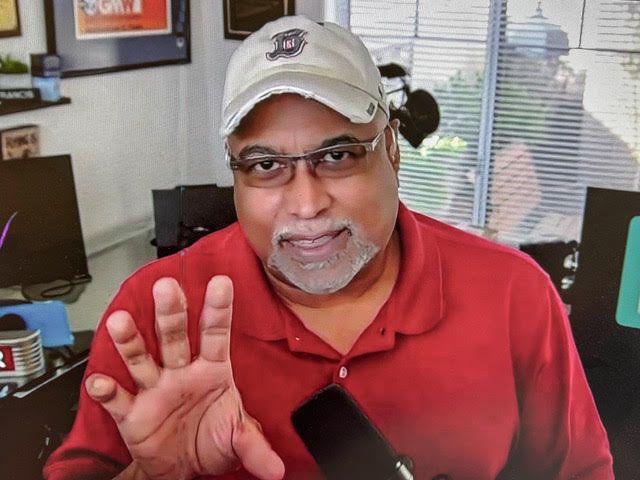 Toward the end of the two-hour discussion, Elliott Francis (pictured), veteran broadcast journalist who is producer/host of “NOW” on Facebook Live, called for “a procedure of certification for journalists much in the same way that meteorologists are granted certifications.”
Toward the end of the two-hour discussion, Elliott Francis (pictured), veteran broadcast journalist who is producer/host of “NOW” on Facebook Live, called for “a procedure of certification for journalists much in the same way that meteorologists are granted certifications.”
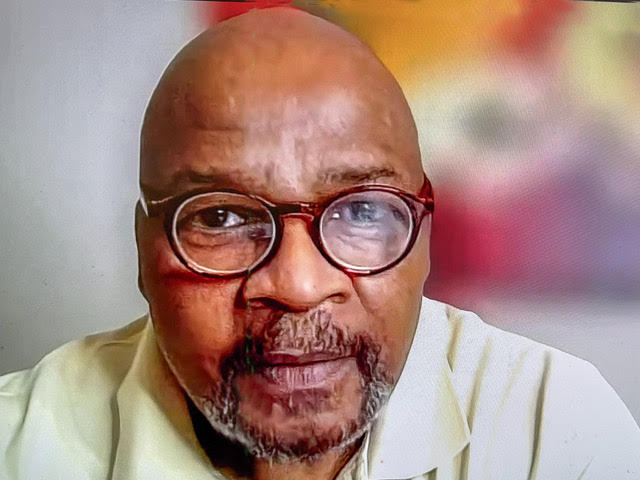 John C. Watson (pictured), J.D., Ph.D., who teaches communications law and journalism ethics at American University, said Francis’ idea was “a gospel I’ve been preaching for 25 years. Once we have this certification slash licensing in place, we can let people know these are the people who are trained to do it. And you can listen and read those other people.” Watson said this would not be called “licensing” nor decided by a government, and he and Francis promised to get back to the Roundtable with a fleshed-out proposal.
John C. Watson (pictured), J.D., Ph.D., who teaches communications law and journalism ethics at American University, said Francis’ idea was “a gospel I’ve been preaching for 25 years. Once we have this certification slash licensing in place, we can let people know these are the people who are trained to do it. And you can listen and read those other people.” Watson said this would not be called “licensing” nor decided by a government, and he and Francis promised to get back to the Roundtable with a fleshed-out proposal.
Contributing: Christian Spencer
Does anyone have a list of legacy media that have not (yet) apologized to, praised and/or paid Trump since Election Day?
— Marc E. Elias (@marceelias) December 14, 2024
ABC to Pay Trump Library $15 Million for ‘Rape’ Error
“ABC News has agreed to pay $15 million toward Donald Trump’s presidential library to settle a defamation lawsuit over anchor George Stephanopoulos’ inaccurate on-air assertion that the president-elect had been found civilly liable for raping writer E. Jean Carroll,” Michael R. Sisak reported Saturday for the Associated Press.
“As part of the settlement made public Saturday, ABC News posted an editor’s note to its website expressing regret over Stephanopoulos’ statements during a March 10 segment on his ‘This Week’ program. The network will also pay $1 million in legal fees to the law firm of Trump’s attorney, Alejandro Brito.
“During a live ‘This Week’ interview with Rep. Nancy Mace, R-S.C., Stephanopoulos wrongly claimed that Trump had been ‘found liable for rape’ and ‘defaming the victim of that rape.’
“Neither verdict involved a finding of rape as defined under New York law.
“In the first of the lawsuits to go to trial, Trump was found liable last year of sexually abusing and defaming Carroll. A jury ordered him to pay her $5 million.
“In January, at a second trial in federal court in Manhattan, Trump was found liable on additional defamation claims and ordered to pay Carroll $83.3 million.
“Trump is appealing both verdicts.”
David Enrich wrote Sunday for The New York Times, “Before and after the election, Mr. Trump and his allies have discussed subpoenaing news organizations, prosecuting journalists and their sources, revoking networks’ broadcast licenses and eliminating funding for public radio and television.
“Actual or threatened libel lawsuits are another weapon at their disposal — and they are being deployed even before Mr. Trump moves back into the White House.“
High-profile Democratic attorney Marc Elias wrote on X, ” “Does anyone have a list of legacy media that have not (yet) apologized to, praised and/or paid Trump since Election Day?”
- Agence France-Presse: As ‘news deserts’ spread, US journalism fights on (April 25)
- Deborah Barfield Berry, USA Today: Racial justice activists prepare for Trump budget cuts and policy changes (Nov. 23)
- CNN: ‘Emboldened’: Stelter on how he thinks ABC News’ settlement impacts Trump and his team (video)
- Dee-Ann Durbin, Associated Press: Food prices worried most voters, but Trump’s plans likely won’t lower their grocery bills (Nov. 14)
- David Enrich, New York Times: Trump and His Picks Threaten More Lawsuits Over Critical Coverage
- Financial Times: How Biden’s Inflation Reduction Act changed the world | FT Film (Dec. 5, 2023)
- Allison Fisher, Media Matters for America: Fox has mentioned the Inflation Reduction Act more than twice as much as CNN — and 40% more than MSNBC — since its passage two years ago (Aug. 21)
- Allison Fisher, Media Matters for America: Mainstream cable news and broadcast networks aired only 19 minutes over the past 75 days scrutinizing Trump’s impossible pledge to cut energy prices in half (Oct. 31)
- Hamil R. Harris, Trice Edney Wire: Black Faith Leaders Regroup To Strengthen Disappointed Voters (Dec. 5)
- Ja’han Jones, MSNBC: How Harmeet Dhillon could upend the Justice Department’s safeguarding of civil rights
- Kipp Jones, Mediaite: MSNBC Rips ABC-Trump Defamation Case Settlement, Says Comment for Which ABC Paid Trump $15 Million ‘Seems to Hold Up’
- Journal-isms: Increasingly, More Put Their Trust in Gossip (Oct. 21)
- Journal-isms: People of Color Too Trusting of Social Media? (May 5)
- Legal Defense Fund: LDF Opposes Nomination of Harmeet Dhillon as Assistant Attorney General
- Ariama C. Long, New York Amsterdam News: Post-election stress: Black women and their mental health (Nov. 14)
- Julianne McShane, Mother Jones: Why the ABC News Settlement With Trump Is Complicated
- Samantha Ragland and Kevin Loker, American Press Institute: Influencer collaborations with local media will benefit journalism — and our communities (Oct. 15)
- Charles Ray, Daily Kos: A Confederacy of Clowns, Cons, and Chaos (Dec. 4)
- Lisa Rein and Jeff Stein, Washington Post: Federal employees scramble to insulate themselves from Trump’s purge
- Reporters Without Borders: “Without borders but never without you”: RSF launches a donations campaign to defend the right to information
- Charlie Savage, New York Times: Trump Tells Republicans to ‘Kill’ Reporter Shield Bill Passed Unanimously by House (Nov. 20)
- Stephanie Sy with Margaret Huang, “PBS News Hour”: Is the political climate influencing a spike in racist incidents? (Nov. 26)
- Michael Tomasky, New Republic: Why Does No One Understand the Real Reason Trump Won?: It wasn’t the economy. It wasn’t inflation, or anything else. It was how people perceive those things, which points to one overpowering answer. (Nov. 8)
- Valerie Volcovici, Reuters: Biden pushes out over $100 billion in clean energy grants as term winds down (Dec. 3)
- Clayton Weimers, Poynter Institute: Freedom of the press is waning. The next president can fix that. (Oct. 1)
- Queenie Wong, Los Angeles Times: Tech billionaires Zuckerberg, Bezos and Altman help bankroll Trump’s inauguration. What to know
To subscribe at no cost, please send an email to journal-isms+subscribe@groups.io and say who you are.
Facebook users: “Like” “Richard Prince’s Journal-isms” on Facebook.
Follow Richard Prince on Twitter @princeeditor
Richard Prince’s Journal-isms originates from Washington. It began in print before most of us knew what the internet was, and it would like to be referred to as a “column.” Any views expressed in the column are those of the person or organization quoted and not those of any other entity. Send tips, comments and concerns to Richard Prince at journal-isms+owner@
View previous columns (after Feb. 13, 2016).
View previous columns (before Feb. 13, 2016)
- Diversity’s Greatest Hits, 2018 (Jan. 4, 2019)
- Book Notes: Is Taking a Knee Really All That? (Dec. 20, 2018)
- Book Notes: Challenging ’45’ and Proudly Telling the Story (Dec. 18, 2018)
- Book Notes: Get Down With the Legends! (Dec. 11, 2018)
- Journalist Richard Prince w/Joe Madison (Sirius XM, April 18, 2018) (podcast)
- Richard Prince (journalist) (Wikipedia entry)
- February 2018 Podcast: Richard “Dick” Prince on the need for newsroom diversity (Gabriel Greschler, Student Press Law Center, Feb. 26, 2018)
- An advocate for diversity in the media is still pressing for representation, (Courtland Milloy, Washington Post, Nov. 28, 2017)
- Morgan Global Journalism Review: Journal-isms Journeys On (Aug. 31, 2017)
- Journal-isms’ Richard Prince Wants Your Ideas (FishbowlDC, Feb. 26, 2016)
-
Richard Prince with Charlayne Hunter-Gault, “PBS NewsHour,” “What stagnant diversity means for America’s newsrooms” (Dec. 15, 2015)
- Book Notes: Journalists Follow Their Passions
- Book Notes: Journalists Who Rocked Their World
- Book Notes: Hands Up! Read This!
- Book Notes: New Cosby Bio Looks Like a Best-Seller
- Journo-diversity advocate turns attention to Ezra Klein project (Erik Wemple, Washington Post, March 5, 2014)

